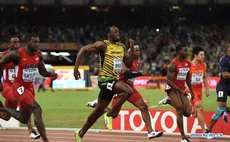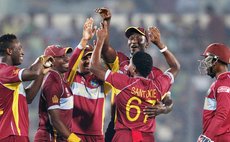Lords unto themselves
Somewhere during one of the ill-fated one day matches of the West Indies latest tour of South Africa I heard a South African commentator asking a West Indian colleague – asking him with bated breath whether there wasn't anyone who could speak to the West Indian players during their training at home by giving suggestions of how to improve in a commonsense fashion their approach to the game, and consequently their level of performance. If I am not mistaken, it was Shaun Pollock, former South African ace speedster who helped the Springboks to ascend the pinnacle of World cricket. It struck me that the West Indies display was nothing less than a horrible embarrassment to the South Africans - not merely from the point of view of international cricket as a worthy entity, but also vis à vis a concept of individual self respect and the innate decency associated with a participant in the art form.
In escapes me that a forthright reply was forthcoming to that poignant enquiry. However, there was every significance in the profound revelation by Pollock that the late great West Indian pace bowler Malcolm Marshall had been instrumental in consistently imparting to his teammates when he played first class cricket in South Africa about a myriad of valuable pieces of advice as to how excellence in bowling could be achieved. Above all, Marshall's wisdom was avidly swallowed by the South African players -and to good effect.
Let us look at the third Test match between West Indies and South Africa at Cape Town starting around New Year. West Indies batted first and scored 329 in 100 overs. This may be considered good going in context of a side struggling to rehabilitate itself, and against the best bowling attack in the world. That is one way of looking at it, but the team with sensible ambition might be inclined to look deeper below the mere surface. A scorecard with pertinent notes may illustrate the required story much better.
Kraigg Brathwaite was first out when he pushed his bat at the ball from Styn that lifted across him to make it 30 for one. One admires Braithwaite for his doggedness and determination to improve his art in the international arena. However, his dismissal fell into the whole business of naiveness and was compatible with the area of awareness raised by Shawn Pollock. A potential towards a promising innings was drastically cut short purely through a lack of elementary discernment on the part of the young batsman.
His opening partner Devon Smith reached 47, only to self destruct by attempting to sweep Harmer an off spinner making his debut. The ball was not short enough and Smith was bowled just when he had done the hard work by facing as many as 86 deliveries. He should, with greater depth of vision towards self preservation, have gone on to craft a sizable hundred, having safely sampled all the pace South Africa had to offer.
That was bad enough. However, the "clear as day" lesson was not learned. Johnson made it to 54 before falling victim LBW to Harmer. Palpably, Johnson did not cover his stumps adequately in playing forward. Better use of his feet might have occasioned the ball striking him outside of the offstump and keeping his innings alive for much bigger things to come.
From 131 for three, Marlon Samuels made it 162 for four - his knock terminated when he cut loosely at Van Zyl introduced for no greater reason than to give the regular bowlers a rest! Samuel's 43 expiring in the 48th over had had the hallmark of nothing less than a classic double century in the embryo.
Chanderpaul had one of his rare streaks of ill-fortune and was stumped for nine, and left it to others to assume responsibility for making fullest use of batting first on a good pitch. However, Blackwood capitulated in the 95th over as he succumbed for 56, indicating his lack of basic competence in coping with the faster bowling of Styn.
As it was, an effort that could have logically yielded 450 runs was cropped down to 329, allowing South Africa to amass a lead of 92 on the strength of Amla's 148 which kept his side's innings together. Typically, it was his mental fortitude at great differential to that of the West Indies batsmen that posted due supremacy.
Without taking anything away from South Africa, the West Indies presented them with a second innings of more patent softness - all out for 215 with Johnson 44, Samuels 74 and Chanderpaul 50 the sole luminaries in rather dense opacity, leaving South Africa to get their win by eight wickets.
That was just the batting as it reflected on the psychological makeup of West Indies. Too much of the bowling was wayward - unlike that of South Africa. Makes me recall the horror reported some years ago of West Indies bowlers recoiling from an invitation to bowl at a prescribed target placed on the practice pitch! Rather than accepting the challenge of accomplishing full display of a technical art, they simply opted out of the assignment! Does that smack of being professional?
We have nothing short of sympathy for Sir Curtley Ambrose and Sir Ritchie Richardson in their task of trying to urge the inferior mortals entrusted to them to elevate their ambitions towards a peerage. Maybe the West Indies cricket board needs to benchmark specific performance targets in their scale of assessments in parallel to payment considerations for their players. Otherwise, they remain lords unto themselves despite complete absence of lordliness in the stamp of their performances!




